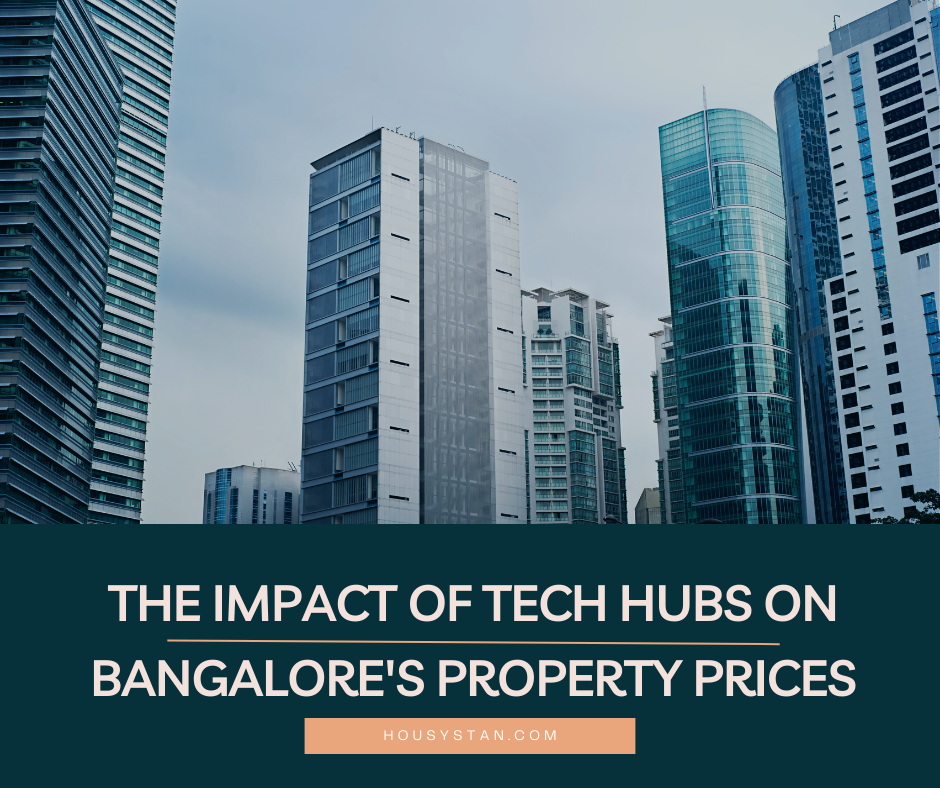The Impact of Tech Hubs on Bangalores Property Prices
Read latest blogs and articles from Housystan

The Information mentioned here was last updated on:
15/2/2026The Impact of Tech Hubs on Bangalore's Property Prices
Bangalore, often hailed as the "Silicon Valley of India," has witnessed unprecedented growth over the last few decades. This transformation into a technological powerhouse has brought about significant changes in various sectors, most notably in the real estate domain. As tech hubs continue to proliferate across the city, they leave a profound impact on property prices, shaping the urban landscape and affecting the lives of its residents.
1. Emergence of Tech Hubs in Bangalore
- Verified Tenants/Buyers
- Unlimited Property Listing
- Zero subscription/charges fee
The rise of Bangalore as a technology hub began in the late 20th century, bolstered by the establishment of massive IT parks such as Electronic City and International Tech Park Bangalore (ITPB). These hubs quickly became magnets for both domestic and international IT firms seeking to capitalize on the city's skilled workforce and favorable economic policies. The influx of tech companies created a demand for office spaces, leading to the development of state-of-the-art business parks.
- Key Turbines of Growth:
- Major IT players like Infosys, Wipro, and TCS rooted their primary operations in Bangalore.
- The presence of multinational corporations such as IBM, Microsoft, and Google attracted global attention.
2. How Tech Hubs Influence Property Markets
As tech hubs expanded, they naturally induced a series of changes in the real estate market. A widely observed phenomenon is the appreciation of property values in the vicinity of these hubs. Here's how tech hubs continue to shape property prices:
- Increased Demand: The demand for housing skyrockets in proximity to tech hubs due to the influx of professionals seeking convenience in commuting to work.
- Development of Infrastructure: Improved infrastructure accompanies tech expansion, including transportation, educational institutions, and healthcare facilities, further boosting property worth.
- Gentrification: As affluent professionals move into areas surrounding tech hubs, these neighborhoods often experience gentrification, raising living standards and property values.
3. Neighborhoods Most Affected by Rising Property Prices
Several neighborhoods in Bangalore have experienced significant property price hikes, directly correlated to their proximity to burgeoning tech hubs:
- Whitefield: Once a quiet suburb, Whitefield has now become a bustling tech hub with numerous IT companies and start-ups. The demand for residential properties here has led to a substantial increase in property prices.
- Sarjapur Road: Close to several major IT parks, this area has seen rapid development, with new residential projects frequently appearing to cater to the housing needs of IT professionals.
- Electronic City: As one of the largest electronic industrial parks, it houses numerous IT offices, leading to high demand and soaring real estate prices.
4. The Ripple Effect on Rental Markets
The boom in property prices due to tech hubs also extends its influence to the rental market. Here's how rentals are affected:
- High Rental Yields: As professionals and expatriates flock to the city, the demand for rental properties rises, allowing property owners to charge premium rents.
- Increased Competition: With limited housing supply, renters often face stiff competition to secure rentals, sometimes leading to bidding wars that further drive up rent prices.
- Short-term Rentals: The influx of business travelers and short-term project professionals has led to a surge in demand for serviced apartments and short-term rental options, influencing overall rental strategies.
5. Challenges and Considerations
While the growth of tech hubs brings economic prosperity, it also poses several challenges to the real estate market:
- Affordability Issues: The steep rise in property prices can make homeownership unaffordable for many, pushing potential buyers into the rental market.
- Urban Sprawl: Rapid development can lead to urban sprawl, putting pressure on existing infrastructure and resulting in longer commute times for some residents.
- Environmental Concerns: Massive construction projects necessitated by tech expansion can lead to environmental degradation if not managed with sustainable practices in mind.
6. Future Trends and Predictions
Looking ahead, several trends and predictions emerge regarding the ongoing impact of tech hubs on Bangalore's property market:
- Sustainable Development: There is a growing emphasis on eco-friendly constructions and sustainable urban planning, which could shape future developments to mitigate environmental concerns.
- Smart Cities: The integration of technology into urban planning and infrastructure is expected to enhance living conditions and maintain property value growth.
- Diverse Investment Opportunities: Beyond residential properties, there's an increasing interest in commercial real estate and co-working spaces tailored to tech startups and entrepreneurial ventures.
7. Strategies for Investors and Homebuyers
For those considering investing in Bangalore's property market, understanding the dynamics of tech hubs can guide strategic decisions:
- Research Localities: Prioritize investments in neighborhoods proximal to tech hubs with upcoming infrastructure projects that promise added convenience.
- Long-term Vision: Focus on properties that offer long-term value rather than short-term gains, considering the fluctuating nature of the tech sector.
- Consider Rental Potential: Evaluate the rental market in the target area to gauge potential returns on investment for both residential and commercial properties.
8. The Broader Economic Impact
Beyond real estate, the tech hub phenomenon in Bangalore has ripple effects across various economic sectors:
- Job Creation: The continual growth of IT firms consistently generates employment opportunities, attracting both skilled and unskilled labor.
- Service Sector Boom: Supporting industries, such as hospitality, retail, and transportation, thrive alongside the tech sector, contributing to local economic growth.
Bangalore's evolution into a technology epicenter is inherently tied to the dynamics of its property market. As tech hubs continue to flourish, they will invariably wield influence over real estate trends, presenting bright opportunities and notable challenges for all stakeholders involved. Crafting informed strategies and mindful urban planning will be pivotal in harnessing the full potential of this transformation for sustainable growth.